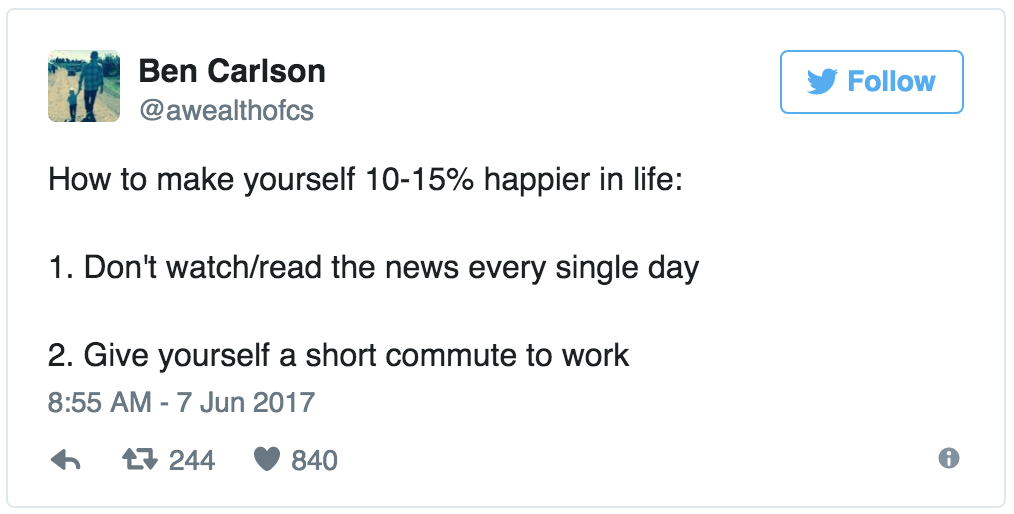The Problem With the Relentless Pursuit of HappinessWritten on the 28 June 2017 by Ben Carlson ) I tweeted the following this week and received a pretty decent response:
You would never realize we live in one of the most peaceful periods in human history when you watch the terrible stories on the news every day. Apathy as a strategy can work to your advantage when most things in life are out of your control anyway. And the research backs me up on shortening your commute cutting down an hour long commute works out to the equivalent of making an extra $40,000 a year. Theses were some of my other favorite suggestions:
And here are a few more of my suggestions that have worked for me:
Happiness seems to be the ultimate goal in life for just about everyone. Gurus have sprung up all over the place telling you to enjoy the little things in life, think positive, pursue your passion and set goals to improve your happiness. The problem with the relentless pursuit of happiness is that making it your only priority can actually be to your detriment. Oliver Burkeman discusses the downside of trying too hard to find happiness in his book, The Antidote: Happiness For People Who Can't Stand Positive Thinking: The startling conclusion at which they had all arrived, in different ways, was this: that the effort to try to feel happy is often precisely the thing that makes us miserable. And that it is our constant efforts to eliminate the negative insecurity, uncertainty, failure, or sadness that is what causes us to feel so insecure, anxious, uncertain, or unhappy. They didn't see this conclusion as depressing, though. Instead, they argued that it pointed to an alternative approach, a 'negative path' to happiness, that entailed taking a radically different stance towards those things that most of us spend our lives trying hard to avoid. It involved learning to enjoy uncertainty, embracing insecurity, stopping trying to think positively, becoming familiar with failure, even learning to value death. In short, all these people seemed to agree that in order to be truly happy, we might actually need to be willing to experience more negative emotions or, at the very least, to learn to stop running quite so hard from them. We're all taught from an early age that trying harder is how you succeed in life. This is good advice but going overboard in some areas in life can backfire if you're not able to handle disappointment and failure on occasion. Learning how to deal with success is easy but learning how to handle disappointment is a skill that doesn't get enough attention. This is venturing into the philosophical realm but I like the Alan Watts ideas here on the downside of trying too hard: Alan Watts, echoing Aldous Huxley, labeled 'the law of reversed effort', or the 'backwards law': the notion that in all sorts of contexts, from our personal lives to politics, all this trying to make everything right is a big part of what's wrong. Or, to quote Watts, that 'when you try to stay on the surface of the water, you sink; but when you try to sink, you float' and that 'insecurity is the result of trying to be secure'. In many cases, wrote Huxley, 'the harder we try with the conscious will to do something, the less we shall succeed'. I'm a big believer in having balance in most things. I like to workout so I can eat junk food. I binge watch TV shows but also love to spend time outdoors. I enjoy learning from non-fiction books but need to read fiction to shake up my reading habits. I love to travel but I'm also a homebody. Unfortunately, life ends up giving you balance whether you want it or not. The happy times never last forever. Everyone fails at some point. No one gets everything they want. But I've learned to accept that you need failure and sadness on occasion to be able to enjoy the successes and happier times. I guess the first step might be finding a few little things in life that can incrementally improve your happiness. Source: The Antidote Original Article: http://awealthofcommonsense.com/2017/06/the-problem-with-the-relentless-pursuit-of-happiness/ Author:Ben Carlson |







